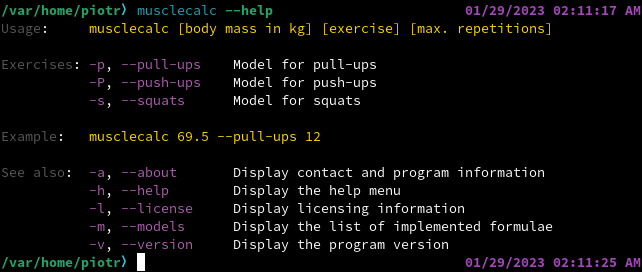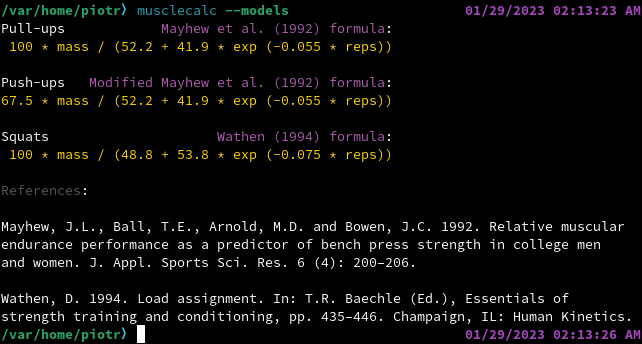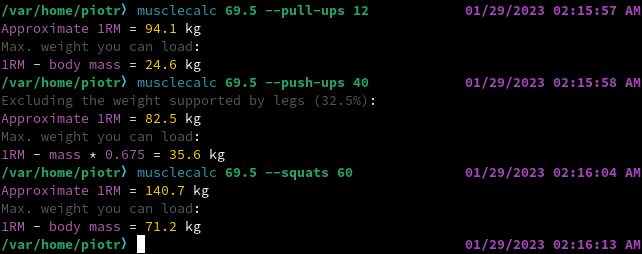6 releases
| 0.2.4 | Jan 29, 2023 |
|---|---|
| 0.2.3 | Nov 26, 2022 |
| 0.2.2 | Sep 29, 2022 |
| 0.2.1 | Aug 16, 2022 |
| 0.0.0-alpha |
|
#409 in Math
145KB
143 lines
MUSCLECALC
musclecalc utilises mathematical formulae from Mayhew et al. (1992) and Wathen (1994) to estimate the maximum weight that can be lifted in a single repetition of a physical exercise, known as the one repetition maximum (1RM). The calculations take into account the body mass, exercise type, and maximum number of repetitions that can be performed without additional weight.
[keywords: bodybuilding, calculator, calisthenics, callisthenics, fitness, gym, muscle strength, physical training, street workout]
Designed for use by both females and males, musclecalc utilises the following models:
1. Pull-ups, including chin-ups, dips, and other upper-body exercises that involve lifting the whole body. The Mayhew et al. (1992) equation is used, as it is possibly more accurate for the upper body (LeSuer et al. 1997; Jiménez and De Paz 2008).
2. Push-ups, for which the a modified Mayhew et al. (1992) formula is used, assuming that 32.5% of the body weight is supported on the ground by legs when push-ups are performed with a typical position of hands at the height of the chest.
3. Squats, for which the Wathen (1994) equation is used, as it is possibly more accurate for the lower body (LeSuer et al. 1997).
References:
Jiménez, A. and De Paz, J.A. 2008. Application of the 1RM estimation formulas from the RM in bench press in a group of physically active middle-aged women. J. Hum. Sport Exerc. 3 (1): 10–22.
LeSuer, D.A, McCormick, J.H., Mayhew, J.L., Wasserstein, R.L. and Arnold, M.D. 1997. The accuracy of prediction equations for estimating 1-RM performance in the bench press, squat, and deadlift. J. Strength and Cond. Res. 11 (4): 211–213.
Mayhew, J.L., Ball, T.E., Arnold, M.D., and Bowen, J.C. 1992. Relative muscular endurance performance as a predictor of bench press strength in college men and women. J. Appl. Sports Sci. Res. 6 (4): 200–206.
Wathen, D. 1994. Load assignment. In: T.R. Baechle (Ed.), Essentials of strength training and conditioning, pp. 435–446. Champaign, IL: Human Kinetics.
USAGE


EXAMPLES

INSTALLATION ON LINUX
musclecalc is designed to be compatible with Windows and macOS, and can be easily installed using cargo. However, the primary development and testing environment for musclecalc is Fedora Linux.
The current version of musclecalc (v0.2.4) has been verified to work properly on Fedora Linux 37 and Ubuntu 22.10.
METHOD 1 – USING CARGO
[Recommended for programmers]
1. To install musclecalc from crates.io, use the following cargo command:
cargo install musclecalc
The executable will be saved in the hidden .cargo/bin/ directory within your home directory.
2a. For easy access, you may want to copy the musclecalc file to the /usr/bin/ directory. This can be done by following the instructions in Method 2 (3a, 3b).
2b. As an alternative, you can add the ~/.cargo/bin/ directory to your system's PATH variable, which can be configured using rustup.
METHOD 2 – UNIVERSAL LINUX BINARIES
1. To install musclecalc, first download the distro-independent binary from GitHub.
2. Then, make the file executable by running the command:
sudo chmod +x ./musclecalc
3a. On most Linux distributions, install musclecalc by copying the binary to /usr/bin/:
sudo cp musclecalc /usr/bin/
3b. For Fedora Silverblue / Kinoite, use this command:
sudo cp musclecalc /var/usrlocal/bin/
METHOD 3 – DISTRO-SPECIFIC PACKAGES
[Recommended for most users]
Distro-specific packages for .rpm and .deb-based Linux distributions are also available for download. To install musclecalc on different Linux distributions, follow these instructions:
Fedora Linux / RHEL / openSUSE:
sudo rpm -i musclecalc-0.2.4-1.x86_64.rpm
Fedora Silverblue / Kinoite:
rpm-ostree install musclecalc-0.2.4-1.x86_64.rpm
Ubuntu:
sudo dpkg -i musclecalc_0.2.4_amd64.deb
METHOD 4 – MANUAL COMPILATION
First, download and unpack the musclecalc source code from GitHub. Next, to build and install the program, use the command:
cargo build --release && sudo cp target/release/musclecalc /usr/bin/